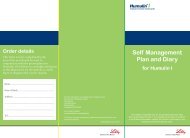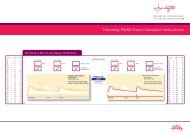Gestational diabetes
Gestational diabetes
Gestational diabetes
Create successful ePaper yourself
Turn your PDF publications into a flip-book with our unique Google optimized e-Paper software.
Personal solutions for everyday life.<br />
<strong>Gestational</strong><br />
<strong>diabetes</strong>
<strong>Gestational</strong> <strong>diabetes</strong><br />
Approximately 3% of women develop <strong>diabetes</strong> during their pregnancy. This is called<br />
<strong>Gestational</strong> <strong>diabetes</strong>. <strong>Gestational</strong> <strong>diabetes</strong> is a form of <strong>diabetes</strong> that usually starts<br />
in the second or third trimester (that is, after the first 12 weeks). It happens when<br />
the body can’t control its own blood glucose level (this can also be referred to as the<br />
blood sugar level). This is thought to be a result of the hormones produced during<br />
pregnancy blocking the action of insulin in the body. Insulin is responsible for<br />
controlling blood glucose levels. In women who develop gestational <strong>diabetes</strong>, there<br />
is not enough extra insulin produced to counteract this blocking effect.<br />
Keeping blood glucose down<br />
It’s important to control the level of glucose in your blood during pregnancy. If<br />
there’s too much glucose in your blood, your baby’s body may start to make insulin<br />
to try to cope with it. This extra insulin can make the baby grow larger, making<br />
delivery more difficult, and potentially cause injury to both mother and baby.<br />
Also, a baby who is making extra insulin may have low blood glucose when he or<br />
she is born, which can affect him or her in the first few hours of life.<br />
Your specialist <strong>diabetes</strong> team will help you control your blood glucose. In general,<br />
you’ll be given advice and support to monitor your blood glucose, eat healthily, and<br />
exercise. If your blood glucose levels are still too high, you may need to start insulin.<br />
Your specialist <strong>diabetes</strong> team<br />
A <strong>diabetes</strong> team is a group of healthcare professionals with specialist knowledge and<br />
experience of supporting people with <strong>diabetes</strong>. For example, teams may include family<br />
doctors, hospital specialists, specialist <strong>diabetes</strong> nurses, and dieticians.<br />
If you are pregnant and have <strong>diabetes</strong>, the <strong>diabetes</strong> team is extended to include<br />
healthcare professionals with particular knowledge of how <strong>diabetes</strong> can affect a<br />
pregnancy, such as a specialist <strong>diabetes</strong> midwife and obstetrician. In this leaflet, this<br />
extended <strong>diabetes</strong> team is called a specialist <strong>diabetes</strong> team.
Checking your blood glucose<br />
People with <strong>diabetes</strong> learn to check their own blood glucose levels. You’ll be given<br />
the equipment you need to do this and taught how and when it should be done.<br />
You’ll also be told the target blood glucose you’re aiming for, and how this is<br />
affected by food and exercise. Sometimes women with gestational <strong>diabetes</strong> have<br />
blood samples sent to a lab for glucose tests.<br />
Your specialist <strong>diabetes</strong> team will explain what your blood glucose should be. Keep a<br />
note of it below.<br />
Your blood glucose levels<br />
Your fasting blood glucose<br />
should be:<br />
1-2 hours after food, your<br />
blood glucose should be:<br />
You should also be offered regular urine tests to check for protein, and blood<br />
pressure checks during your pregnancy. You may also be offered a late scan to check<br />
the size of your baby (this depends on the arrangements for scans in your area).<br />
Eating healthily<br />
You should be given advice about eating healthily by a dietician or specialist<br />
<strong>diabetes</strong> nurse. In general, try to eat fruit, vegetables and low-fat dairy products. Cut<br />
out sugary, high-fat foods such as cakes and biscuits.
Folic acid<br />
Keep taking your folic acid every day during the first 12 weeks of your pregnancy.<br />
Medication<br />
If you follow the advice of your specialist <strong>diabetes</strong> team but your blood glucose<br />
levels are still too high, you may need to start insulin. Your specialist <strong>diabetes</strong> team<br />
will explain how to take the insulin and what its effects will be.<br />
In particular, when you’re starting on insulin you should be given advice about<br />
hypoglycaemia (having ‘a hypo’ see the box opposite). This is when your blood<br />
glucose drops to a low level (usually under 4 mmol/l).<br />
If you drive, you need to inform the DVLA<br />
that you have gestational <strong>diabetes</strong> and are<br />
taking medication. You will be able to<br />
continue driving unless you have ‘disabling<br />
hypoglycaemia’ - your specialist <strong>diabetes</strong><br />
team can advise you on this. If your<br />
treatment carries on for longer than<br />
3 months, you need to contact the<br />
DVLA again to let them know.
Coping with hypos if you’re taking insulin<br />
Hypoglycaemia (‘a hypo’) is when your blood glucose drops to a low level<br />
(usually under 4 mmol/l)<br />
• Check your blood glucose regularly<br />
- always check it before doing something where you may put yourself or others<br />
at risk if you become drowsy or faint (e.g. driving)<br />
- always check it before doing a long session of exercise<br />
• Carry something that will give you a quick burst of glucose if you feel a hypo<br />
starting, such as:<br />
- half a glass of sugary drink, or<br />
- three glucose tablets (which are available from the pharmacy), or<br />
- a glucose gel that can be placed in your mouth, inside your cheek<br />
• Afterwards, eat a carbohydrate snack (such as a sandwich)<br />
• Let your specialist <strong>diabetes</strong> team know if you start having hypos<br />
• If you start having frequent hypos, you must stop driving. You must not start<br />
again until your family doctor or specialist confirms that you are OK to start<br />
driving again<br />
Exercise<br />
Regular exercise can help keep your blood glucose stable. And, of<br />
course, it’s also good for you in general. Your specialist <strong>diabetes</strong><br />
team can give you advice on what’s best for you.
During labour<br />
During labour, your blood glucose levels will be monitored closely by your specialist<br />
<strong>diabetes</strong> team. You may need to have an insulin infusion during labour (this is<br />
where a continuous amount of insulin is fed into your blood through a tube).<br />
Women with <strong>diabetes</strong> sometimes have larger than average babies, and you may<br />
need to be induced (so labour is started earlier than normal) or have a Caesarean<br />
delivery. This will be discussed with you in the final weeks of your pregnancy.<br />
After the birth<br />
Your baby will have a heel prick test to check his or her blood glucose level. Your<br />
team will want to monitor the baby’s blood glucose levels closely for the first 24<br />
hours, and this may mean that he or she is taken to the special care baby unit. Your<br />
baby isn’t being tested for <strong>diabetes</strong> during this time, but is being monitored to see if<br />
extra feeds are needed to stabilise the blood glucose levels.<br />
You probably won’t have <strong>diabetes</strong> after you’ve given birth, but you may be asked to<br />
monitor your blood glucose. And if you’ve been taking insulin, you should be able to<br />
stop after the birth.<br />
You should be offered a repeat blood test some time in<br />
the 6 weeks after the birth to check that your blood<br />
glucose levels have gone back to normal.<br />
The timing of this test will depend on the<br />
arrangements in your area.<br />
Breast-feeding<br />
Breast-feeding is generally thought to be best for babies,<br />
and there’s no reason why you shouldn’t breast-feed<br />
your baby if you’ve had gestational <strong>diabetes</strong>.
In the future<br />
If you’ve had gestational <strong>diabetes</strong>, it’s more likely that<br />
you’ll develop it again in future pregnancies. You also have<br />
a higher chance of developing type 2 <strong>diabetes</strong> if you’ve<br />
had gestational <strong>diabetes</strong>. To help guard against this, eat<br />
healthily and include some physical activity in your day.<br />
Aim to do 30 minutes of exercise that leaves you slightly<br />
out of breath at least five times a week. You should have a<br />
follow up appointment with your doctor for tests to rule<br />
out <strong>diabetes</strong> after your baby is born.
Other information<br />
Other leaflets in this series include<br />
specific explanations of some of the<br />
terms used here. Leaflets on blood<br />
testing, hypos, travel, impact on sexual<br />
health, driving and employment, illness,<br />
and complications may be particularly<br />
helpful for you. Ask your <strong>diabetes</strong> team<br />
for the ones you want.<br />
Further information is available from<br />
Customer Care<br />
Contact numbers and notes<br />
Lilly UK Answers<br />
Lilly House<br />
Priestley Road<br />
Basingstoke<br />
Hampshire RG24 9NL<br />
Tel: (01256) 315000<br />
www.lilly<strong>diabetes</strong>.co.uk/patients<br />
Provided as a service for patient care<br />
UKDBT01179 June 2012











![Humalog Mix50 (50% insulin lispro [rDNA origin] injection ... - LillyPro](https://img.yumpu.com/44269187/1/184x260/humalog-mix50-50-insulin-lispro-rdna-origin-injection-lillypro.jpg?quality=85)

![Humalog Mix25 (25% insulin lispro [rDNA origin] injection 75 ...](https://img.yumpu.com/35487335/1/184x260/humalog-mix25-25-insulin-lispro-rdna-origin-injection-75-.jpg?quality=85)


